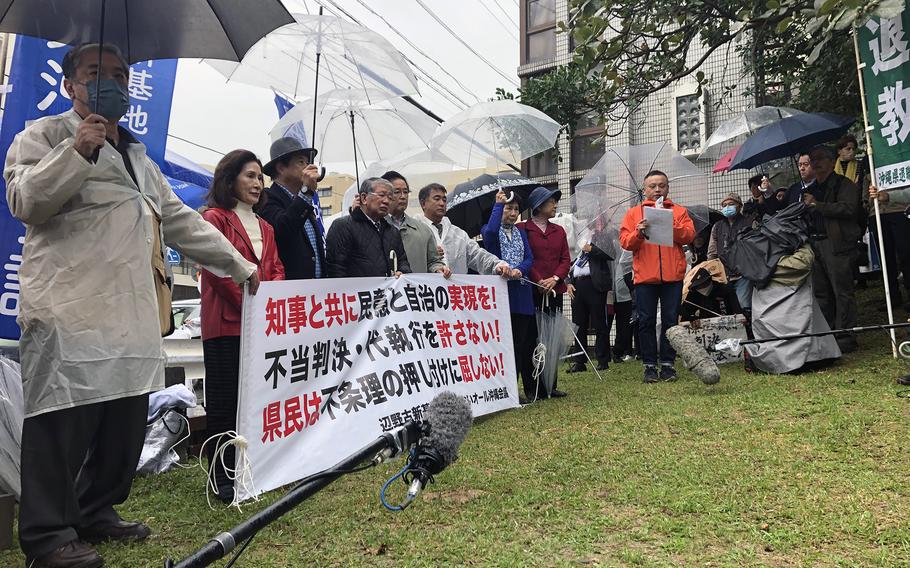Marine Corps
Japanese court overrules Okinawa governor, hands Marine airfield decision to Tokyo
Stars and Stripes December 20, 2023

Protesters rally in a park across from the Fukuoka High Court, Naha branch, in Naha, Okinawa, Japan, on Dec. 20, 2023. (Mari Higa/Stars and Stripes)
NAHA, Okinawa — A Japanese court sided with Tokyo on Wednesday and wrested permitting approval for a Marine Corps runway at Camp Schwab away from Okinawa Gov. Denny Tamaki.
A three-judge panel from the Naha branch of the Fukuoka High Court gave Tamaki until Monday to approve permit changes pending since April 2020. The changes address reinforcement of a soft seabed in one of two construction zones.
If Tamaki does not sign off, Japanese Minister of Land, Infrastructure, Transport and Tourism Tetsuo Saito has only to issue a notice to the governor before approving the permits himself, a spokesman from the ministry’s Water and Disaster Management Bureau said by phone Wednesday.
Tamaki’s continued refusal to approve permitting is causing significant public harm, Chief Judge Takashi Miura said from the bench.
Tamaki’s “determination not to approve is clear and firm,” Miura said. He acknowledged the difficulty in bringing the two parties to an understanding.
Some government officials in Japan may speak to the media only on condition of anonymity.
The runway being built on reclaimed land in Oura Bay in the Henoko area of Okinawa may one day replace Marine Corps Air Station Futenma in urban Ginowan. That base, surrounded by homes and schools, is considered inherently dangerous by some Japanese officials.
Tamaki started a protracted legal battle in November 2021 when he refused to sign off on project changes requested by Okinawa Defense Bureau, which represents Japan’s Defense Ministry on the island.
He argued that the soft seabed in the construction zone poses a hazard and that Tokyo had failed to consider the environmental impact on the endangered dugong, a cousin of the manatee protected by Japanese law.
Saito overturned Tamaki’s decision in April 2022 as “illegal and unreasonable.” Tamaki then filed and lost three lawsuits; Japan’s Supreme Court in September ordered him to approve permitting.
Following the high court decision, Saito first recommended Tamaki grant the permits by Sept. 27 and then demanded he comply by Oct. 4. Tamaki refused both times, and Saito filed suit Oct. 4.
About 100 protesters gathered Wednesday afternoon in a park across the street from the courthouse. They held banners and gave anti-base speeches.
“No matter what the verdict will be, we have to keep resisting the Henoko (construction) and the strengthening of military power,” said Hiroko Oshiro, 72, of Naha city. “I know we will get a bad result, but we have to keep on showing our will.”
Just before 2 p.m., journalists and about a dozen elderly residents packed the courtroom. Shouts erupted from the gallery after the ruling was read.
Tamaki did not attend the five-minute proceeding. A spokesman in the prefecture’s Henoko Base Construction Countermeasures Division declined to comment on the verdict by phone Wednesday afternoon. He said Vice Gov. Takekuni Ikeda planned a press conference at the prefectural offices that evening.
The Land Ministry spokesman declined to say whether Saito was preparing the notice or planning to restart construction.
The construction zone at Schwab is divided into two main sections — 279 acres on the base’s north side and 91 acres in the south. Work on the larger parcel has been on hold since April 21, 2020, when the defense bureau first asked Tamaki to approve changes to the construction plans.
The project, originally slated for completion by 2014, may now finish by 2032 and cost the Japanese government $6.9 billion.